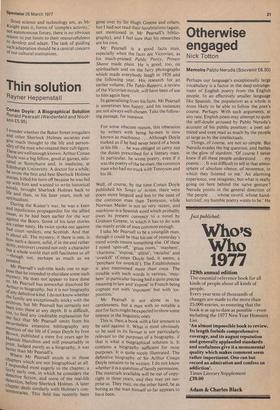Thin solution
Rayner Heppenstall
Conan Doyle: A Biographical Solution Ronald Pearsall (Weidenfeld and Nicolson £5.95)
I wonder whether the Baker Street irregulars and other Sherlock Holmes societies ever give much thought to the life and persona% of the man who created their cult figure. These are well enough known. Arthur Conan boYle was a big fellow, good at games, educated at Stonyhurst and, in medicine, at Edinburgh University. A doctor for a while, he wrote the first and best Sherlock Holmes stories, killed his hero off because he was fed Up with him and wanted to write historical novels, brought Sherlock Holmes back 'to life and then, in his later years, took up spiritualism.
During the Kaiser's war, he was a keen and injudicious propagandist for the allied cause, as he had been earlier for the war against the Boers. Some of his later stories are rather nasty. He twice spoke out against bad court verdicts, one Scottish. And that IS about all. The mystery, if there is one, is how such a decent, solid, if in the end rather
but extrovert created not only a character °In a whole world that still fascinates us all —though not, perhaps as much as we pretend.
"r Pearsall's sub-title leads one to supPose that he intended to elucidate some such mystery. He does not appear to have done SO. Mr Pearsall has somewhat dissolved Sir Arthur in biography, but it is not biography of any definitive kind. I do not know whether the family are exceptionally sticky with the archives, but Mr Pearsall has certainly not been into these at any depth. It is difficult, too, to find any creditable explanation for the fact that Mr Pearsall omits from his nevertheless extensive bibliography any mention of the life of Conan Doyle by fvor birrown, published a mere five years ago by marnish Hamilton and still presumably in P. rint. Judged purely as a biography, it was better than Mr Pearsall's.
Where Mr Pearsall excels is in those chaPters which are not biographical at all. ,
responded most eagerly to the chapter, a 1,airlY early one, in which he considers the detective fiction, and some of the real-life detection, before Sherlock Holmes. A later chapter deals similarly with Holmes's contemporaries. This field has recently been
gone over by Sir Hugh Greene and others, but I had not read their lucubrations (again, not mentioned in Mr Pearsall's bibliography), and feel sure that his researches are his own.
Mr Pearsall is a good facts man, especially when the facts are Victorian, as his much-praised Public Purity, Private Shame made plain. He is good, too, on spiritualism and on the fairy photographs which made everybody laugh in 1920 and the following year. His research for an earlier volume, The Table-Rappers, a review of the Victorian occult, will have been of use to him again here.
In generalising from his facts, Mr Pearsall is sometimes less happy, and his instances are not always well-chosen. Take the following passage, for instance.
For some obscure reason, this obsession by writers with being he-men is now known as machismo. . . Although Doyle looked as if he had never heard of a book in his life. . . he was obliged to carry out the duties prescribed for a literary man. In particular, he wrote poetry, even if it was the poetry of the he-man, the common man who had no truck with Tennyson and his ilk.
Well, of course, by the time Conan Doyle published his Songs of Action, there were poets more languid and less to the taste of the common man than Tennyson, while Norman Mailer is not so very recent, and machismo is a Spanish word which probably owes its present currency to a novel by Graham Greene, in which it has to do with the manly pride of men common enough. I take Mr Pearsall to be a youngish man, though it could be that his use of yesterday's trend words means something else. Of these I noted `spin-off,' 'grass roots,"mayhem', 'charisma."exposé,"elitise, 'racialist' and 'overkill' (Conan Doyle had, it seems, a 'penchant for overkill'). The Establishment is also mentioned more than once. The trouble with such words is various, 'mayhem' in particular having had a quite precise meaning in law and 'exposé' in French being cognate not with 'exposure' but with 'exposition.'
Mr Pearsall is not alone in his carelessness, but a man with so notable a zest for facts might be expected to show some interest in the linguistic ones.
This is, then, a book with a fair amount to be said against it. What is most obviously to be said in its favour is not particularly relevant to the purposes of a biography, if that is what a biographical solution is. It contains a biography sufficient for most purposes. It is quite nicely illustrated. The definitive biography of Sir Arthur Conan Doyle remains to be written. I do not know whether it is a question of family permission. The materials available will be out of copyright in three years, and they may yet surprise us. They may, on the other hand, be as boring as the man himself so far appears to have been.


































 Previous page
Previous page